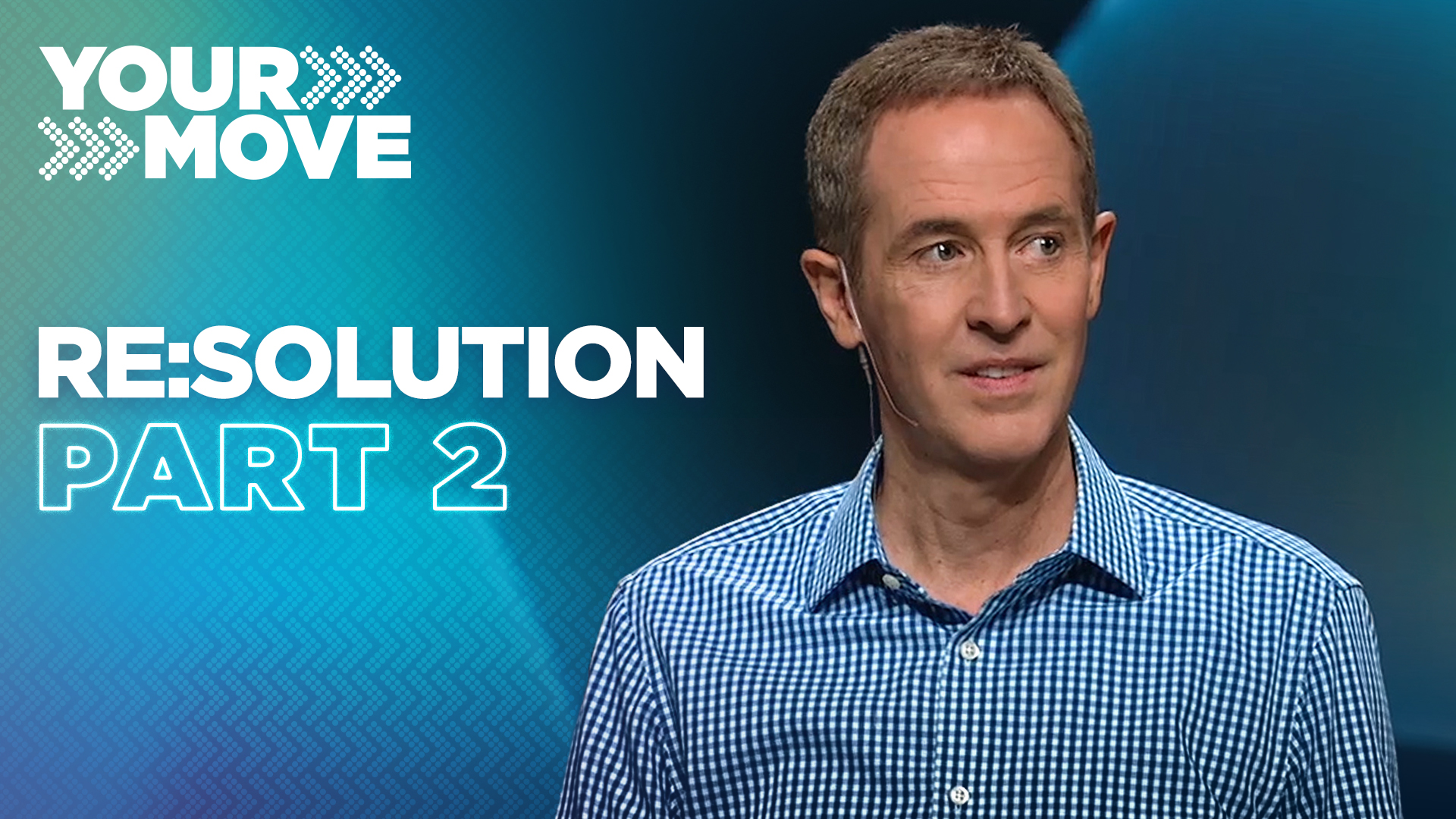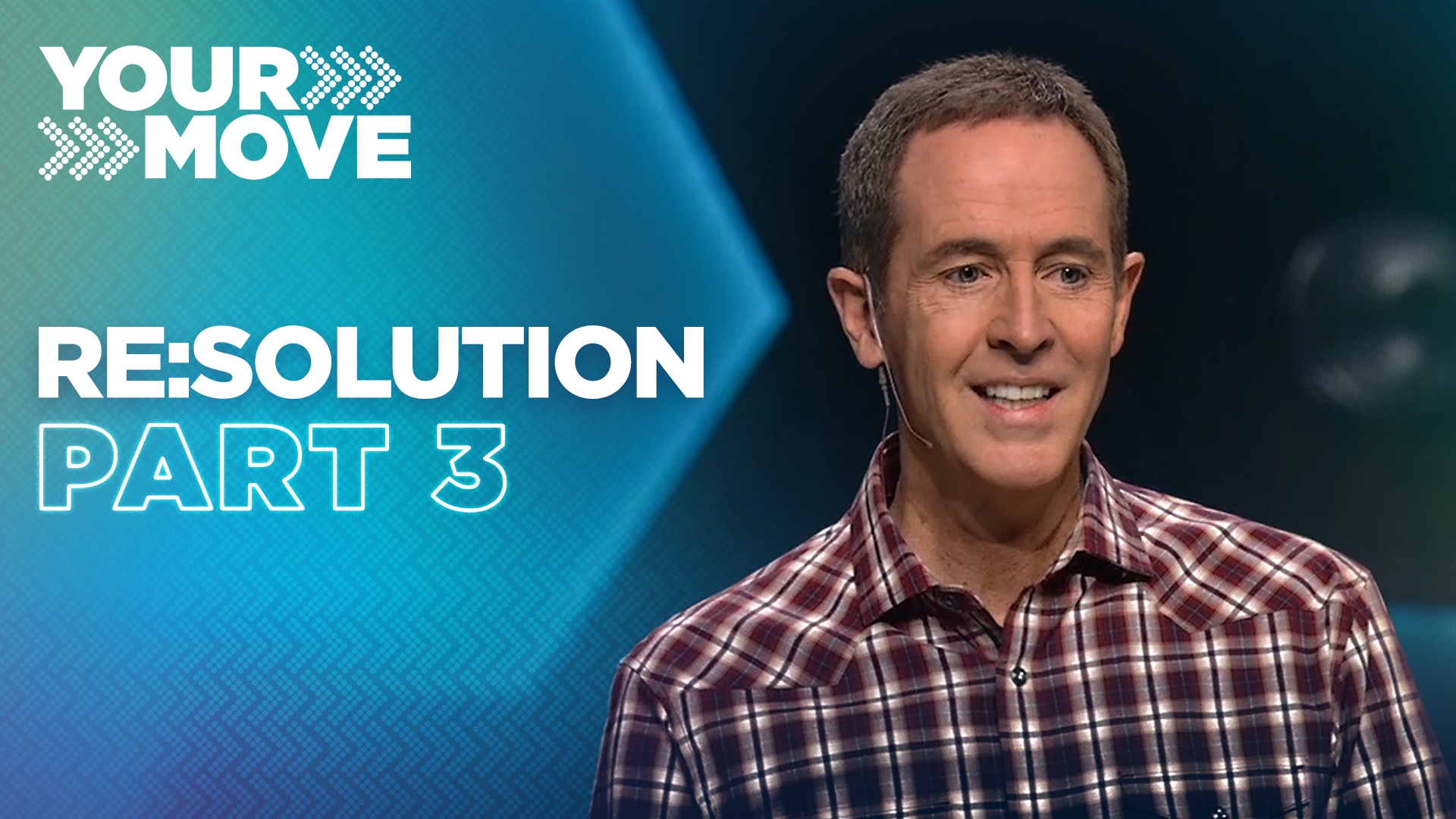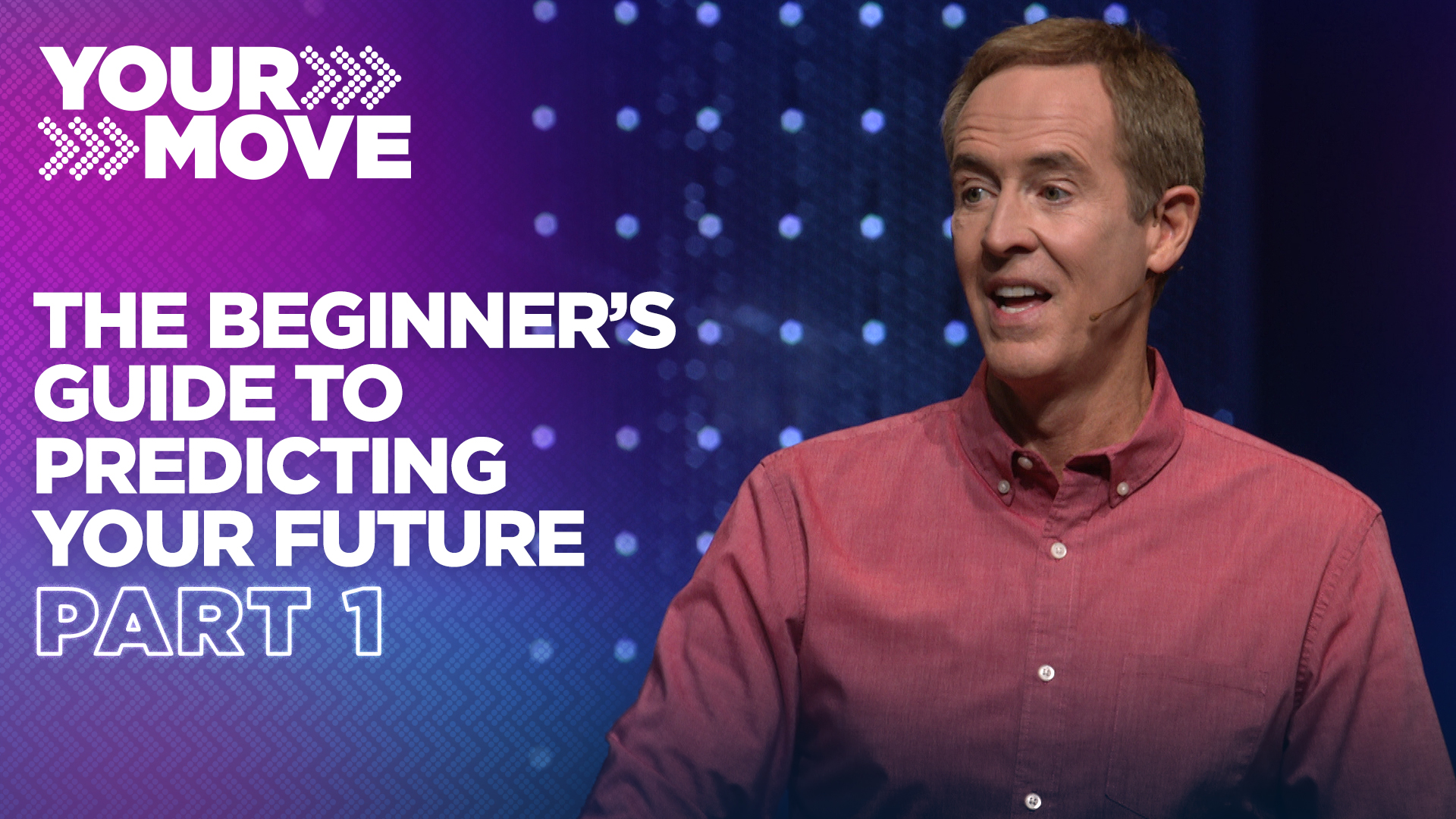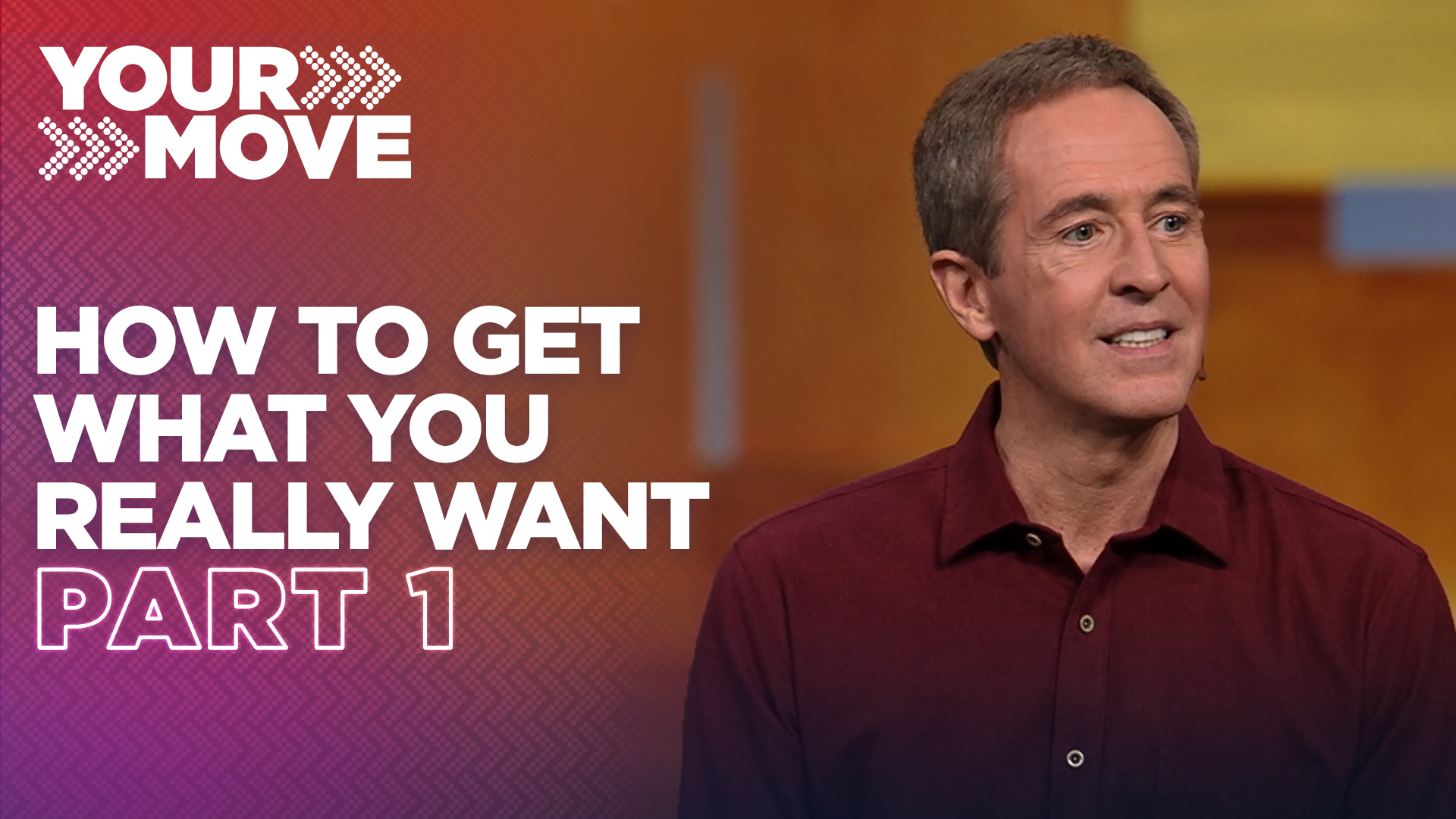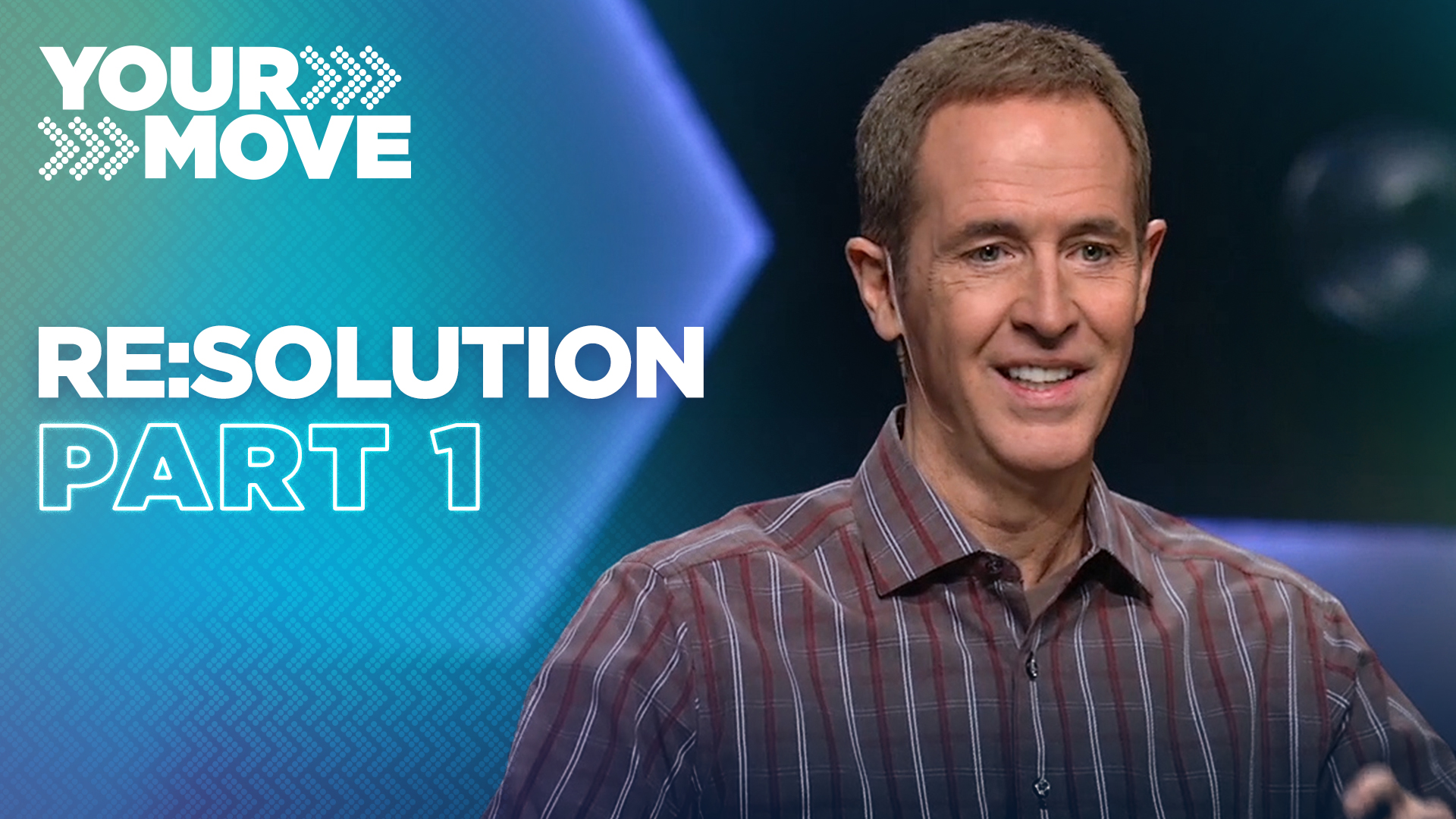The new year is all about making ourselves better people. In this episode, Andy suggests becoming better people by doing something to make the world a better place.
NOTE: The following content is a raw transcript and has not been edited for grammar, punctuation, or word usage.
How many of you have set some New Year’s resolutions and you’ve already broken them? Can I see? Can I see? How many of you, like me, it’s like, “Aim low, and then you don’t miss it, so I just don’t have New Year’s resolutions.” It’s just like, “Let other people do that.” Yeah. Well, hopefully you have at least thought about the new year and what you wanna do different. And it’s really the season of self improvement, I just wanna make myself a better version of me, you wanna make yourself a better version of you. Churches generally have really high attendance the first month of the year, and then it wanes off. Health clubs, you show up, those of you who go all the time, it’s like, “Who are all these new members?” They’re not new members, they just come in the month of January.
And it’s not a bad thing, it’s a good thing to stop and re-evaluate and think about what we’re eating, what we’re not eating, what we’re supposed to do, get out of debt, all those kinds of things. But basically, for the whole month, or at least the first part of the month, the question that we end up focusing on, just because of our culture, is, “What should I do about me? How do I make me a better version of me?” And that’s not a bad thing, “How do I get slimmer? How do I get stronger? How do I get smarter? How can I get out of debt?” All those things are good.
But for us, for the next few weeks, I want to try to focus your attention, and to focus our attention on a bigger, better, broader question. It’s a little bit threatening, in fact, some of you are gonna be really disturbed by the question, and that’s good, that’s why we’re gonna talk about it for three weeks and not just one week.
And so, this is gonna disturb you a little bit, that’s okay. And to introduce the question, I’m actually gonna do something we don’t normally do. This isn’t something we do all the time. I’m actually gonna read you an entire chapter from the Bible. It’s from the Book of Nehemiah. In fact, the first chapter from this ancient document, that we call “The Book of Nehemiah.” This takes place right after what’s often called “The Jewish Exile.” A little history lesson for you real quick, the Jewish Exile, about 605 BC, the Babylonians invaded Judah, and if you think of modern day Israel, there was sort of a top half and a lower half, northern kingdom, southern kingdom. They invaded what was called “The Southern Kingdom”, or “Judah.”
And so, for about 70 years, for about 70 years, the Nation of Israel shut down, temple worship shut down. They kinda went out of business, because they had been conquered by the Babylonians. About 70 years go by, the Persians have conquered the Babylonians, and so Cyrus the Great decided, “Hey, why do we have these Jews scattered all over the place?” He made a proclamation to everybody everywhere, “Hey, if the Babylonians took you out of your homeland and sent you somewhere, everybody go home. Everybody just go home.” So, everybody was able to migrate back to their nation of origin. And so, hundreds… Well ultimately, tens of thousands, and eventually hundreds of thousands of Jews migrated back to Israel to crank up the economy, get the temple going and all of that. But it didn’t go so well, because they had been gone for so long, and so many of the best and brightest had been taken, and basically kidnapped by the Babylonians 70 years prior.
So, they’re having trouble getting things going, and the economy is stalled, and other people have moved into that region and suddenly, all these Jews are coming back and they’re like, “Wait a minute, where have you guys been?” And so, a lot, a lot, a lot of things went on. So, about 90 years later, so you’ve got the Babylonians, and the Persians, and after people were allowed to go back to Jerusalem, about 90 years later is where we meet Nehemiah. Nehemiah was a Jewish man, we don’t know if he’d ever even been to Israel, we don’t know if he’d ever been to Judah, we don’t know if he’d ever even seen the city of Jerusalem, when we meet Nehemiah he’s working for King Artaxerxes of Persia. And so, all we know is that Nehemiah is in Persia, essentially working for this king, and he begins to journal his story and we have it in our English bibles and it’s called “The Book of Nehemiah.” That’s why it’s a fascinating, fascinating story. So, what I wanna do, is I’m gonna read the first chapter from this Old Testament Book, Nehemiah, and then I’m gonna ask you this disturbing question, and then we’re gonna talk about it for the next three weeks. Any questions?
Good. Okay, so here’s how it goes, ready? You can follow, I’m just gonna read it up here on the screen. “The words of Nehemiah, the son of Hachaliah. In the month of Kislev… ” Now this is important, because this is history, this isn’t “once upon a time”, this is history. “In the month of Kislev, in the 20th year, while I was in the citadel of Susa,” and Susa was essentially the primary city. They didn’t really have capital cities, but it was the capital city of the Persian empire. “While I was in the citadel of Susa, Hanani, one of my brothers came from Judah, southern part of Israel, with some other men, and I questioned them about the Jewish remnant.” Now remember all these people are migrating and emigrating back to their homeland, and so he’s asking about how that’s going… And those that had survived the exile, because remember, these are families that have been displaced. They have kids, they have grandkids, and so they’re moving back in that direction, and also about Jerusalem.
So these guys come to see Nehemiah, and Nehemiah who maybe has never been there, is like, “How’s it going? I mean, you got the temple thing going. I mean, are we a nation again? How’s it going?” And they said to me, “Those who survived the exile, and are back in the province are in great trouble and disgrace. Nehemiah, it’s not going well, really, it’s terrible.” He goes on. He says, “The wall of Jerusalem is broken down, and its gates have been burning with fire,” which basically means, “We have no defense. We’re a no man’s land. People come, people go. There’s all these other cities, there’s all these powerful people, and no, I mean, people are moving back… People are moving back in that direction, but things are not good.”
And then this next very powerful statement, “When I heard these things, I sat down and wept.” In other words for Nehemiah, this wasn’t just news, “Oh, that’s interesting. Hey, too bad to be you.” And then here’s a check. God bless and good luck because I live in Susa. I work for the king. I eat and live indoors. I know where every one of my meals is coming from. I know what I’m gonna do day to day. I’m raising my family in the most powerful, most wealthy culture in the whole world. Sorry about Jerusalem. See yeah, don’t want to be yeah.” That was not his response.
When he found out what was going on, his heart was broken, and he wept, continues, “For some days, I mourned, and fasted, and prayed before the God of heaven.” And then he journals his prayer that he prayed for his nation, probably the nation that he never visited… Then I said, “Lord, the God of heaven, the great and awesome God who keeps His covenant.” Now Nehemiah is reminding God, “Okay, God, you keep your promises, right? I’m just reminding you, you keep your promises.” And he uses the word “covenant” because God established a covenant with Israel, and how he’s gonna say back to God what God originally said to the nation, “Who keeps his covenant of love with those who love him, and keep his commandments,” because in the Old Testament, God had set up this somewhat conditional relationship with Israel that went like this, “Here are my laws. If you keep my laws, you get to live in your land. If you break my laws and abandon me, if you break my laws and embarrass me, if you break my laws and are no longer a light to the rest of the world, then I’m gonna take your land away from you, and you’re gonna be sent to other nations around the earth.”
He says, “Who keeps his commandments, let your ear be attentive, and your eyes open to hear the prayer of your servant as praying before you day and night for your servants, the people of Israel.” And then he does something interesting. He says this, “I confess the sins, we Israelites including myself, and my father’s family,” I’m not pointing fingers, “have committed against you. We have acted very wickedly towards you.” Implication: “We deserve to be thrown out of town. We deserve to be thrown out of our land. We broke the agreement that you established with our forefathers so long ago. We have not obeyed the commands, decrees, and laws you gave your servant Moses,” because this contract began with Moses many years prior.
“Remember the instruction you gave your servant Moses,” saying, now he’s gonna quote to God, God. He’s quoting God to God. It’s interesting. “If you are unfaithful, I will scatter you among the nations,” which is exactly what had happened, that’s why he’s in Susa not back in Judah. “If you are unfaithful, I will scatter you among the the nations, but if you return to me, and obey my commands, then,” check this out… “Then even if you are exiled people are at the farthest horizon, I will gather them from there, and bring them to the place I have chosen as a dwelling for my name because Israel was God’s nation. The city of Jerusalem was precious, and they’re in the temple, the holy of holies they believe was the very presence of God. They, talking about Israel, are your servants, and your people whom you redeemed.
Now he’s saying, “You remember the whole Moses thing, and the plagues, and Egypt, ‘Let my people go.’ I mean, you went to great trouble to redeem your people from Egypt, and now we’re not in Egypt. We’re scattered all over the place. And so once again, God, would you be willing to redeem? Would you be willing to bring your people back from whom you redeemed by Your great strength and Your mighty hand? Lord, let your ear be attentive to the prayer of this, your servant, and to the prayer of your servants who delight in revering Your name.”
And then he asked for something specific. He says, “Give your servant success.” This is so awesome. “Give your servant success today by granting him favor in the presence of this man.” Now here’s what he’s about to do. Nehemiah, who’s got it made, and he’s a got a great job. He’s living the life. I mean, he’s in the palace. He’s got everything he wants, everything he needs. He is like… He is in daily contact with the most powerful person on the planet and he’s about to go to King Artaxerxes and say, “King Artaxerxes, I need an indefinite leave of absence. I would like to leave my cush job. I would like to leave this incredible environment that you’ve created. I would like to leave my family, and I would like to go to Jerusalem, and help my people rebuild their city, and re-establish their presence in the land.”
Now you didn’t ask the king for favors, that’s why there’s a king. The king does all the asking. This was risky. Not only was it risky… Even if the king said, “Yes,” it would be a huge sacrifice for Nehemiah. But Nehemiah’s heart was broken and he felt compelled to act on what he had heard. Then I love the way this chapter ends ’cause it’s just, it’s just this dramatic statement. “I was cup bearer to the king.” So here’s my question and I don’t expect you to have an answer today. It’s okay. Here’s the question. You ready? Everybody say, “We’re ready.”
We’re ready.
Even if you’re at home, “We’re ready,” here we go. Here’s the question. What breaks your heart? What breaks your heart? When you look around in your community, when you look around in your neighborhood, when you look around in your city, when you look around our country, when you look at the economy, when you look at the school system, when you look at what’s happening with families, when you look at what’s happening with children, maybe when you look at what’s happening with just the whole state of our nation… I don’t know what it is that captures your attention, but when you look around your community, when you look around your neighborhood, when you look around this world, what captures your emotion? What breaks your heart?
In other words, when you’re just thinking about whatever it is you wanna think about, what is that one thing that you just, maybe you just can’t get it off your mind. Your heart, your mind, your thoughts, it just goes there. And when it goes there it’s so disturbing, in fact, it’s so disturbing you try not to think about it because you tell yourself, like we all do, well I can’t do anything about that. It’s always been that way, it’s always going to be that way. Nothing’s gonna change. I don’t know anybody. I’m a nobody. I don’t have any resources. I am too young, I am too old, I am too middle class, I am too busy, I am too disconnected; and I hope God, God would you please send someone over there to do something about that because that’s a really big problem and I can’t even think about it for very long because I get emotional about it.
What breaks your heart? It’s a dangerous, dangerous question. And instead of going into this year asking the question that most people will ask, what can I do about me and what should I do about me? What if we asked the question what should be done around me? Because here’s the truth and I think we all agree with this, if you really wanted to become a better person, if you really wanna become a better person this year, then do something this year that makes the world a better place. The old Latin proverb says what man is a man who does not leave the world or does not make the world better.
Now here’s something else that I know about you, ’cause it’s true of all of us. The people that you admire the most, the people that you admire most, the people that you tell your children about, the biographies that you read, the people that have inspired you to greatness, the people that you admire the most are not the people who are able to maintain their ideal weight. Right? They’re not the people that got out of debt. “Oh my gosh, you gotta read this, he got out of debt. I’m serious, he had like $12,000 of credit card debt and they got out of debt. You gotta, this is, I’m so inspired.” I mean that’s good, it’s important and some of you need to get out of debt and some of you need to lose weight, a lot of you need to lose weight, okay. You need to get into shape, you need to eat five vegetables, five servings of vegetables every day, you need to do all that stuff, right?
But listen, that’s not what inspires you. What inspires you, what inspires me, the people we’re so grateful for are the people who’ve made the world a better place or who have made someone’s world a better place because nobody’s gonna change the world but everybody has the potential to change somebody’s world and some of you have the potential to change a slice of the world. And all of us have the potential to find someone whose heart is where our heart is and to join them in the grand adventure of making a difference in the world.
If you’re not gonna do this, let me predict what this next year’s gonna look like for you. You’re gonna sit around and watch television and you’re gonna blame everybody and you’re gonna blame. Blame, blame, blame, blame, blame. But here’s the deal, people who blame things, come on you know this, people who blame things, they don’t change things. You’re gonna look at something and it’s just gonna break your heart or grip your heart and your defense mechanism’s gonna be, “Somebody needs to do something about that and it’s the President’s fault and it’s the Congress’ fault and it’s the PTA’s fault and it’s the school system’s fault and it’s the tax commissioner’s fault and it’s the preacher’s fault and it’s everybody’s fault.”
And you know what, you’re gonna sit in front of the television and you know you’re gonna mute it so you can do commentary for the rest of your family, you know, it’s like, you know, listen, and mute. “Listen kids, look at me, let me tell you what’s going on in the world ’cause I got it going on.” I guarantee you, you are gonna spend some time and energy blaming something, blaming somebody for something you don’t like. But as long as you’re blaming, nothing ain’t changing, okay. Blame, listen, blame is not a strategy for changing anything. Blame is how we avoid changing things. So what if, just imagine, what if you took all the time and energy you planned to spend this next year blaming and actually focused it on helping to bring about change in an area that breaks your heart? What breaks your heart? You should know the answer to that question.
Now if you’re not a Christian or not a religious person, you know so far so good, this applies to all of us. In fact, some of the most extraordinary changes that have happened in the world have happened from people who didn’t commit to any kind of necessarily religious belief. You know, there’s all kind of people that make all kinds of extraordinary changes, just because something broke their heart and they didn’t need a Bible verse and they’d never heard of Nehemiah, they just acted on what broke their heart and phenomenal things have happened. But if you’re not a religious person or not a Christian person, I can’t tell you what to do. I mean you just gotta figure out what to do with what breaks your heart.
But if you’re a Christian, and let me be more specific, ’cause that can mean so many things. If you’re a Jesus follower, and by that, I mean, if to the best of your ability, and none of us get this perfect, if to the best of your ability you are committed to living your life according to what Jesus taught, then you must be actively involved at some level in your life and at some place in our culture, bringing about change, because people who actively follow Jesus make things better. They just do. You can’t actively follow Jesus and not make somebody’s life better. You can’t actively follow Jesus and not make the place where you live and the place where you work and the people you’re with, better, it’s impossible because of what Jesus talked and because of what Jesus modeled.
I mean, one of the things that we talk about a lot here is this thing that Jesus taught, that devotion to God, devotion to God is measured in terms of devotion to others, that Jesus completely broke the temple system, the temple system for all religions, back from Athens, from the Greeks to the Egyptians, to all the Pagan religions If you want God’s attention, then pay attention to how you treat other people because every person you are ever, eyeball to eyeball with, is made in the image of God and people matter to God and so people should matter to you.
And you can’t go to a temple and go through some routine and you can’t go to church on Sunday and go through some routine and somehow win the favor of God. Because God is very, very interested in how you treat other people. That devotion to God is measured in terms of your devotion to other people. That love for God is equated to love for others. And so consequently, when you follo w Jesus around through the gospels, everywhere Jesus went, people were better off. He didn’t just feel compassion, he acted compassionately. And then Jesus did this other thing that…
Jesus taught that people have inherent value, not ascribed value. This is huge. In other words, Jesus modeled that there’s not a pecking order, there’s not, “Well I’m a Roman and you’re not a Roman, I’m so sorry.” It’s not, “Hey, I’m a slave owner and I’m a slave.” It’s not, “Well I’m a man [chuckle] and you’re a woman.” It’s not the color of skin, it’s not how much money we have. And in the religious system Jesus showed up in, if you had a lot of money, the assumption was it’s because God gave you greater value than people who had less than you did. And Jesus came along and the way he conducted ministry and communicated without any question, that everybody was valuable to God. That was an enormous, enormous shift in thinking in the First Century. That men, women and children were ascribed by… Had inherent value according to Jesus. Tax collectors, gentiles, centurions. People were constantly shocked at the people that Jesus served, because in their minds, it was God and then there was an order of things. And Jesus completely scrambled it. Because, Jesus believed as we said a second ago. That every single person you come into contact with is made in the image of God.
And so to be like Jesus and to live our lives like Jesus, there’s no order, there’s no first class and second class. There are just people for whom Christ died. And so consequently, throughout the generations of Christendom, throughout the generations, men and women, Christian men and women in the name of Jesus have built hospitals, not for Christian people, for people people. They’ve built orphanages, not for Christian children, for children children. They built shelters, not for the homeless Christians, but for the people who were homeless. We do medical mission trips, not to take care of the people who say, “Well I’m a Christian”, but for people who are sick. The same with who we build schools for. Jesus taught we don’t assign value to people for any reason. People are inherently valuable. Consequently, consequently, when it comes to what breaks our heart, our hearts can be broken by human need, regardless of where those people live.
This is such an American thing, I think it’s so easy to misunderstand the fact that this is not normal, this is not natural, this is not intuitive, what’s intuitive is, “I’m better than you based on what I have, where I live, who I know and the color of my skin.” But Jesus completely turned that upside down and at the beginning of our nation, it’s so interesting to me, when they wrote the Declaration of Independence, they really… They wrestled with the phraseology and the phrases and the terms that they use at the beginning of the Declaration of Independence. You may know this, but Thomas Jefferson he submitted the first draft or the first draft of this particular part of the Declaration of Independence. Here’s how he said it, you’ve heard a version of this: “We hold these truths to be sacred and undeniable.” Sacred and undeniable. Now, we know what comes next. “We hold these truths to be sacred and undeniable.” Now, what’s about to come next. This isn’t just obvious. This isn’t just common sense. This goes beyond that. Benjamin Franklin came along and said, “Let’s shorten it. We hold these truths to be self-evident.”
In other words, if you think about it long enough, you should go, “Well, yeah, doesn’t everybody understand that?” And the whole statement that you’ve heard so many times, “We hold these truths to be self-evident.” That all men are created equal. That they are endowed by their creator with certain unalienable rights. This is a massive idea that was introduced by your Savior in a world that understood that not. And this is why, when something breaks our heart about the needs of humanity, when something breaks our heart about human rights, when something breaks our hearts about what happens to families and children, it is God stirring our hearts to say, “I feel what you feel, and what you feel may be a reflection of what I feel and have placed in you to feel.” What breaks your heart?
Now, the other interesting thing about Nehemiah’s story, is that Nehemiah’s broken heart was by divine design. Now, one of the things that ancient Jewish people used to believe and one of the things that Christians have always believed is that history is linear. That something’s happening, that it’s going somewhere, that it’s moving in a direction. That God works in history towards specific goals and specific ends. What Nehemiah didn’t know… What Nehemiah didn’t know was that when God stirred his heart to go back to Jerusalem and rebuild the wall, it was part of a sequence of events that had started before him and would go on long after him. That he was playing a critical role. But he had no idea what hung in the balance of his decision to give in to his broken heart.
About 70 years before Nehemiah… A little more history. About 70 years before Nehemiah, God stirred the heart of a man with a very fascinating name, named Zerubbabel. And God stirred Zerubbabel heart to say, “Go back and start rebuilding the temple.” About 14 years before Nehemiah’s heart was stirred, God stirred another man’s heart named Ezra. He said, “Go back and teach the people the law. Get the temple operating, teach people the law.” And then, he stirred Nehemiah’s heart to say, “Nehemiah, go back and get them organized, reestablish my city.” and all of that… Imagine this, because they had no idea. All of that was in preparation for what would happen 444 years later, when the final Jewish prophet, priest and king we know as Jesus walked into that very city, went to the temple, and declared who he was to the Jewish people. And all of that history we find in the New Testament, this was a set up for that. God sent His son into this world to do for us what we could not do for ourselves, because our sin broke His heart. And Nehemiah’s decision to embrace his broken heart was part of what God was up to the whole time, and he had absolutely no idea.
Now, here’s what some of you need to hear. Maybe this is something all of us need to hear. You have no idea… I’ve told you this before. You have no idea what hangs in the balance of your decision to embrace the burden God has put on your heart. You have no idea. You have no idea what and you’ve no idea who. You have no idea what segment of our population, you’ve no idea the people in your community or your city or nation. You’ve no idea of what hangs in the balance of your decision to create some space, to feel what it is that God wants you to feel and do what God wants you to do. You have no idea what hangs in the balance of your decision to embrace the burden that God has placed in your heart.
And here’s the thing, okay? I think you should lose weight and get out of debt. I really do. I do. I think you should lose weight and get out of debt. But there is more to you than a body and a balance sheet. And your body and your balance sheet are too small a thing to dedicate your life to. So what breaks your heart? What breaks your heart? What breaks your heart? What scares you to think about? And this doesn’t mean you have to become an activist. It doesn’t mean you have to quit your job. It doesn’t mean… In fact, I’m not advocating that you do anything irresponsible. The question is, what breaks your heart? And is there someone you could attach yourself to? Is there an organization that you could get involved with? Is there somebody you could become associated with? Is there something you could do that could become an outlet for you to give that extra time, that extra energy, that margin to something that has stirred your heart and may have stirred your heart for a long, long time?
This is how great things happen. This is truly a new year’s resolution. Because here’s what you know and here’s what I know and here’s what we all know. If you really wanna become a better person, do something to make the world, or do something to make someone’s world a better place. You say, “Well, Andy, that’s disturbing and I don’t know, and I’m involved in all kinds of things. And there’s 20 things that break my heart, and my wife’s really nervous now, my husband’s really nervous now, and my parents just got me back in school and now they’re going to be afraid I’m going to drop out of school again.” I understand. So here’s the thing, just sit on it a week. But ask yourself that question, God, what breaks my heart? And what could I do about what breaks my heart? And what could I do with who I am? That’s why I love the way the first chapter of Nehemiah ends. He tells that whole story, then he says, “I was cup bearer to the king.” In other words, this was the opportunity I had. This was the stewardship of influence I had. This is who I was, and so, consequently, I took who I was, and I did with who I was and what I had, what I could to address the thing that broke my heart.
This is how the world is changed. This is how someone’s world has changed. And this is how you set yourself up to wake up a year from now and look back on the most extraordinary year you’ve ever had. Not simply because you lost a few pounds. Not simply because you ate better than you’ve ever eaten before. But because you feel like my heart, my life, my resources, is in sync with what God has created and called me to do. So, what breaks your heart?


